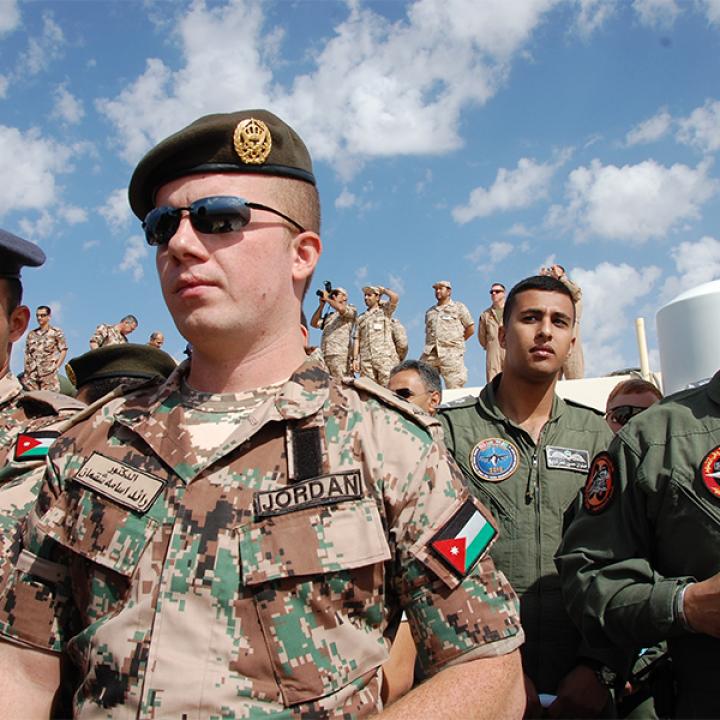

Since last summer the Obama administration has been missing in action as the Islamic State of Iraq and al-Sham, or ISIS, conquered much of Syria and Iraq. But as the terrorist organization now turns its sights on the pro-Western Kingdom of Jordan, Washington can no longer ignore its territorial gains.
Jordan does not appear threatened by an ISIS military offensive. But if ISIS is not rolled back in Iraq, terrorism perpetrated by the radical Islamist group will eventually reach the kingdom.
The Jordanian Armed Forces is cohesive, competent, nonsectarian and loyal to King Abdullah. It trains extensively with U.S. forces and receives $300 million in annual U.S. military assistance. In armor and air power, the kingdom's defenses are more than adequate to secure its 112-mile border with Iraq. Jordan has fortified its positions along its 225-mile Syrian frontier as well.
On June 22 ISIS captured the Iraqi city Ar Rutba, 90 miles from Jordan, as well as the border crossing of Turaibil. Jordan quickly reinforced its defenses, moving tanks and troops -- reportedly including the vaunted 71st Counter Terrorism Battalion -- to the border. It also dispatched F-16 fighter jets to target ISIS forces on the Iraqi side of the border.
A more pressing concern than the border is that ISIS will establish a base of support within Jordan of men committed to violent subversion. The scenario is not far-fetched. From 2002-05 Jordan experienced a series of deadly terrorist operations perpetrated by ISIS's antecedent, al Qaeda in Iraq, a group led by Jordan national Abu Musab al-Zarqawi. Jordanian militants today generally appear to be more sympathetic to the Syrian al Qaeda affiliate Jebhat al Nusra, but ISIS does have a cadre of supporters. On June 20 dozens of men demonstrated in support of ISIS in the town of Maan.
In April several Jordanian ISIS members fighting in Iraq posted a video on YouTube, invoking Zarqawi and shredding and burning their passports. The jihadists -- one of whom is wearing an explosive belt -- describe King Abdullah as "despotic" and "a worshiper of the English," vowing to "slaughter" him.
Jordan takes the terrorist threat seriously -- in 2013 it spent $1.3 billion, nearly 13% of its budget, on internal or homeland security and national defense. The U.S. provided the kingdom with more than $1 billion in 2013, including $360 million for economic assistance, $300 million in military aid, a $200 million supplemental cash transfer, and $140 million to care for nearly one million Syrian refugees.
To better enable Jordan to counter militant Islamist inroads, Washington is going to have to do more -- particularly in economic support. In addition to raising economic assistance to $700 million next year, the U.S. could convene a "Friends of Jordan" conference to encourage the monarchy's Western friends and regional allies -- like Saudi Arabia and the United Arab Emirates -- to increase financial contributions.
Today the underserved, economically depressed and restive regions such as Rusayfa, Zarqa, and Maan provide the lion's share of Jordanian jihadists in Syria. Economic development and job creation might make these areas less fertile ground for militant Islamist recruitment. In the near term, a large cash infusion would at least diffuse domestic tensions and foster more good will toward Amman.
The kingdom would benefit from expanded U.S. training in counterinsurgency warfare and detecting improvised explosive devices. Jordan's operational capabilities would also be improved by additional U.S. Black Hawk helicopters, which are well suited for rapid troop deployment and counterterrorism missions. Jordan has only eight of these aircraft in service.
U.S. Central Command should coordinate a joint border-defense strategy for Jordan and Saudi Arabia, two states currently in ISIS's cross hairs. Until Baghdad regains control of its western border, Washington should encourage Jordan to continue aggressive cross-border actions against ISIS. Now that Washington has deployed drones over Baghdad to defend the U.S. Embassy, the Obama administration should consider moving armed unmanned air assets over western Iraq to help Jordan establish an ISIS no-drive zone along the Jordanian border.
ISIS and Jebhat al Nusra can feed domestic instability and subversion within Jordan. The key is to act now to insulate the kingdom from any onslaught. Given the trajectory of Syria and Iraq, the pro-West regime in Amman is too valuable for Washington to leave to chance.
David Schenker is the Aufzien Fellow and director of the Program on Arab Politics at The Washington Institute.
Wall Street Journal



